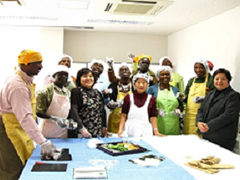Ms. Elizabeth Chiboboka Kalubi
Training Officer, Department of Human Resource and Administration, Cooperative College, Ministry of Agriculture and Cooperatives, Zambia
- Course Title: Rural Community Development by Livelihood Improvement Approach for Africa, 2010 Region-focused training
- Implementing Partner: NTC International Co., Ltd
- Organizer: Tsukuba International Center (JICA TSUKUBA)


I am a training officer of Cooperative College in Zambia. I teach students agricultural production economics. In addition, I go to agricultural cooperatives to train staffs. Further, I teach extension staffs capacity building.
Rural areas in Zambia have many problems. First, people there heavily depend on subsidy from Zambian Government. Second, farmers are very poor because the selling prices of vegetables and crops to the government or business people are very low and maze harvest is only once a year due to rain patterns. Third, women's workload is very heavy. They have to do too many things in their home. Fourth, farmers have to do farming by hand. They have no farm animals or machines.
Before I came to Japan, I did not understand the concept of "Livelihood Improvement Approach". I did not know how rural community can develop through this approach at all. Therefore, this course gave me a basic idea and led me to a starting point of "Rural Community Development by Livelihood Improvement Approach for Africa".
In this training, I could learn many ways to improve livelihood. For example, I learnt (1) how farmers can make their life better by utilizing what they already have in their area, (2) how they add value to agricultural products, (3) how they effectively use promising agricultural products, (4) how they can improve their life without external assistance and support.
After returning to my country and gaining an approval to my action plan from my boss, I will (1) sensitize the idea of livelihood improvement approach in Chongwe District to implement this approach, (2) demonstrate how to do this approach, show pictures for it, and/or bring group members who have been already implemented this livelihood improvement approach. It would be very difficult for me to teach this idea and make them understand the effects of the approach because most of them depend on subsidy and are illiterate. However, I will do my best to convince them to adopt this livelihood improvement approach to their life.
April 15, 2011




scroll